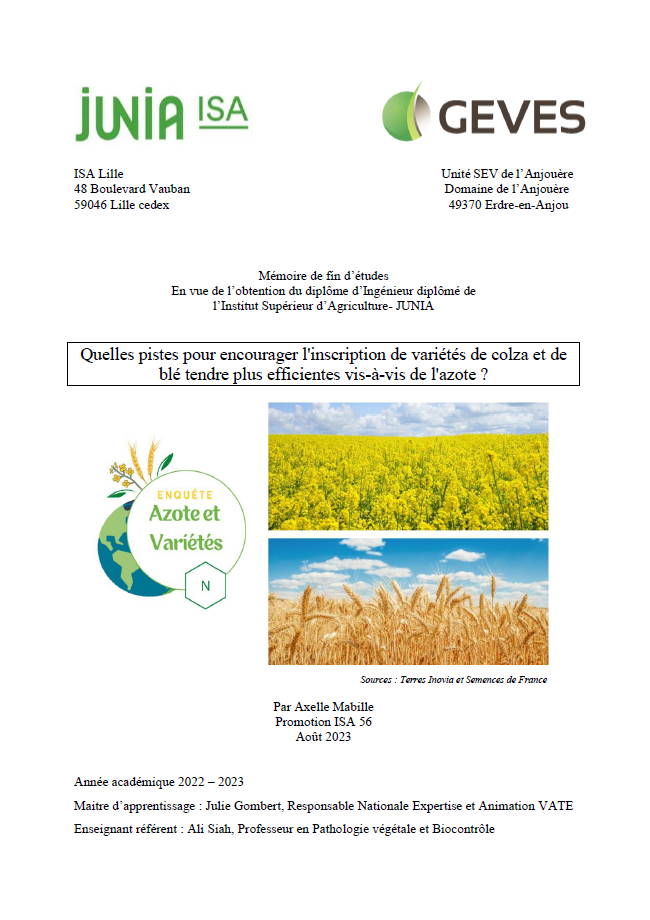|
Towards more nitrogen-efficient varieties
France
July 1, 2024

Agriculture is responsible for almost 20% of greenhouse gas emissions in France and almost 90% of national nitrous oxide emissions, which are closely linked to nitrogen fertilisation (mineral or organic). Nitrogen is an essential nutrient for crop growth, and there are many ways of optimising its use and limiting its impact on the environment. Among these, the varietal lever is one of the strategies recommended by the Seeds and Plants for Sustainable Agriculture Plan (SPAD) 2, and work is currently being carried out by GEVES and its partners to encourage varietal innovation in this area.
The CTPS aims to evaluate candidate varieties for registration for their behaviour with regard to mineral nitrogen fertilisation, in order to support the agro-ecological transition. Since 2012, the oilseed rape trial network has reduced the recommended optimum nitrogen dose to encourage more nitrogen-efficient varieties (since 2015, 40 fewer units of mineral nitrogen have been applied than recommended, a reduction of almost a quarter compared with the average reference dose in the trial network). On the straw cereals side, the national soft wheat trial network has included trials at two fertilisation levels since 2013 (at the optimum nitrogen dose and at a reduced dose of 80 units) to observe the behaviour of candidate varieties in situations of nitrogen restriction. After more than 10 years of applying these evaluation rules, the CTPS and GEVES wanted to take stock of these practices and identify ways of encouraging the registration of more nitrogen-efficient varieties.
After GEVES set up a working group at the beginning of 2023, made up of nitrogen experts, with or without a link to variety evaluation, and experts from the CTPS Soft Wheat or Rapeseed committees, and an apprentice engineer’s survey (for 2022/2023) of seed industry stakeholders on expectations in terms of the nitrogen use efficiency of varieties, the VSCU committees for these 2 species are currently working on the subject. On 22 May, the Rapeseed VSCU committee organised a day of discussions on evaluating nitrogen-efficient rapeseed varieties, with a view to defining them more precisely and working on the joint development of an experimental protocol to characterise varieties that are more tolerant of nitrogen deficits (whether induced or provoked). This was an opportunity to share the latest technical and scientific knowledge on nitrogen and varieties. More information to follow.
How can we encourage the registration of more nitrogen-efficient rapeseed and soft wheat varieties?
Axelle Mabille 2023, Final dissertation for the Institut Supérieur d’Agriculture- JUNIA engineering degree.

Click to enlarge
Main conclusions of Axelle Mabille’s work, 2023
- Seed industry stakeholders see the varietal lever as having great potential for improvement to meet the challenges of mineral fertilisation.
- Overall, expectations differ from one species to another and from one stakeholder to another, which means that the specific characteristics of each species need to be taken into account. For example, in soft winter wheat, more consideration is given to the impact of a reduction in nitrogen on protein content than in rapeseed.
- However, some common expectations have been identified, enabling the pooling of ideas and research efforts, particularly in terms of the ability to characterise environments and to take account of genotype-environment interactions when evaluating varieties.
- The industry expects nitrogen-saving varieties that maintain good yield and protein content potential in limiting situations.
- To identify these varieties, it has been suggested that trial networks and practices could be developed: for example, by including specific trials to study nitrogen behaviour in oilseed rape or by working on the type of nitrogen stress to be applied (percentage reduction, reduction in nitrogen units, elimination of one or more inputs) depending on the stage of the crop in the dedicated trials for these two species.
-
More news from: GEVES, Groupe d'Etudes et de contrôle des Variétés et Semences
Website: http://www.geves.fr Published: July 1, 2024 |
|
The news item on this page is copyright by the organization where it originated
Fair use notice |